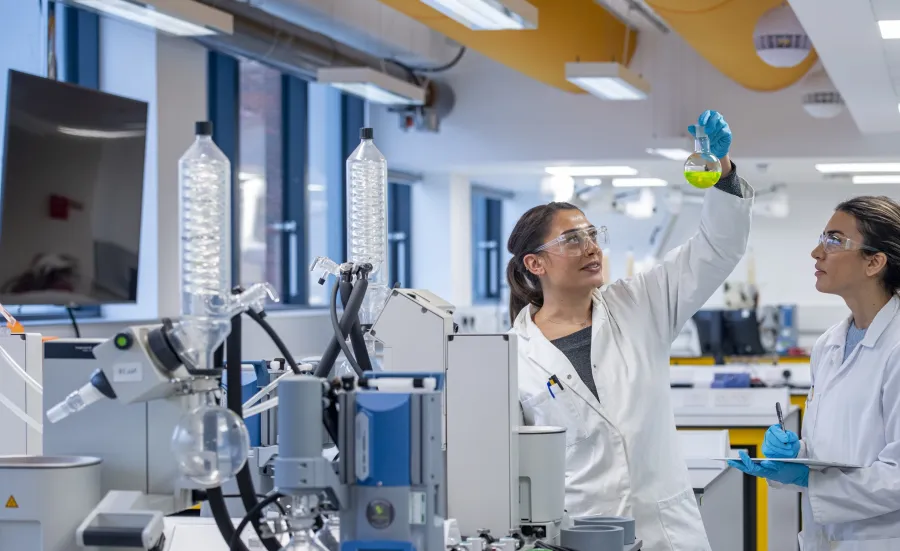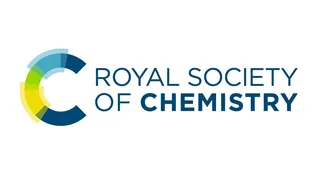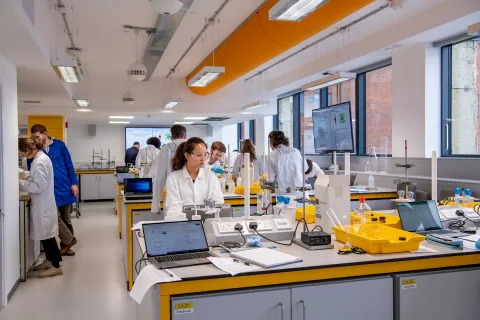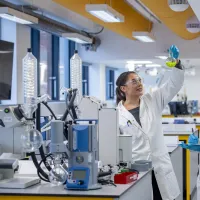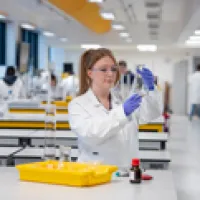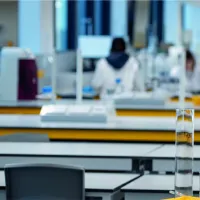About this course
Digital technologies are transforming chemistry research with data science, AI and machine learning. This integrated 4-year Chemistry (Digital Methods and Computational Modelling) degree prepares you for a career in future-focused industries such as pharmaceutical, biotechnology, health and medical.
Alongside your studies in organic, physical and inorganic chemistry studies, you’ll take specialist modules, including:
- Chemistry through the Computational Microscope
- Artificial Intelligence and Machine Learning in Chemistry
Southampton is one of the few UK universities where you can study this subject to master’s level.
If you’re passionate about chemistry and digital technology, this course is ideal for you. You don’t need any previous computing experience - we tailor programming training to your level.
By the time you graduate you’ll be able to:
- write your own programs
- use state-of-the-art software to analyse big data
- explore digital simulations of molecules in high detail
You’ll work in modern, refurbished labs and use Iridis, the University’s supercomputer for your project work.
In your final year you’ll complete an extended research project that leads to a master’s qualification, known as an integrated master’s degree. Your project can be in an area of computational chemistry that interests you. You can carry out this project:
- in our research facilities
- as part of a year-long industrial placement
- as an external placement at a university overseas
Whichever route you choose you’ll gain specialist experience and transferable skills to support your career.
Southampton is a research-led Russell Group university. Your course is informed by academics whose research shapes the way chemistry is studied and applied. Their work ranges from developing cleaner energy through advanced battery technology, to designing drugs for challenging cancers, and applying digital modelling to combat infectious diseases. You’ll benefit from their knowledge and enthusiasm in lectures and seminars.
You’ll graduate as a fully trained chemist with modelling and analysis skills. Your skills will help you build a career in the chemical industry or software development. This degree also provides excellent preparation for a PhD.
We regularly review our courses to ensure and improve quality. This course may be revised as a result of this. Any revision will be balanced against the requirement that the student should receive the educational service expected. Find out why, when, and how we might make changes.
Our courses are regulated in England by the Office for Students (OfS).
Accreditations
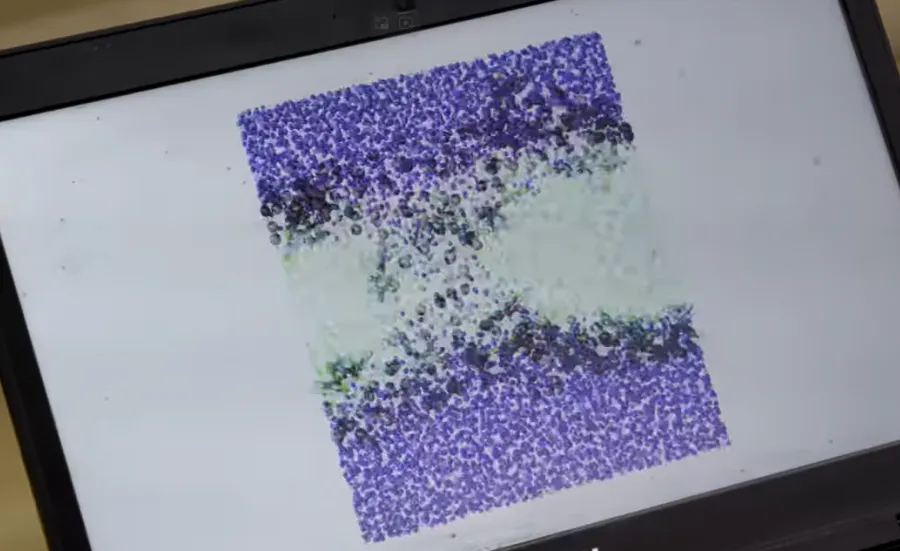
Introducing MChem Chemistry (Digital Methods and Computational Modelling)

The Chemistry teaching labs are my happy place – it’s so satisfying to see the way my skills are developing. My PAT (Personal Academic Tutor) is always there to make sure I’m on track and to point me towards opportunities.
Course locations
This course is based at Highfield and Boldrewood.
Awarding body
This qualification is awarded by the University of Southampton.
Entry requirements
For Academic year 202627
A-levels
AAA including chemistry, with a pass in the Practical exam (where it is separately endorsed) and mathematics
A-levels additional information
Offers typically exclude General Studies and Critical Thinking.
A-levels with Extended Project Qualification
If you are taking an EPQ in addition to 3 A levels, you will receive the following offer in addition to the standard A level offer: AAB including chemistry, with a pass in the Practical exam (where it is separately endorsed), and maths, plus grade A in the EPQ
A-levels contextual offer
We are committed to ensuring that all learners with the potential to succeed, regardless of their background, are encouraged to apply to study with us. The additional information gained through contextual data allows us to recognise a learner’s potential to succeed in the context of their background and experience. Applicants who are highlighted in this way will be made an offer which is lower than the typical offer for that programme as follows:
ABB including chemistry, with a pass in the Practical exam (where it is separately endorsed) and mathematics
International Baccalaureate Diploma
Pass, with 36 points overall with 6,6,6 in three Higher Level subjects including chemistry and mathematics (AA or AI)
International Baccalaureate contextual offer
We are committed to ensuring that all learners with the potential to succeed, regardless of their background, are encouraged to apply to study with us. The additional information gained through contextual data allows us to recognise a learner’s potential to succeed in the context of their background and experience. Applicants who are highlighted in this way will be made an offer which is lower than the typical offer for that programme.
International Baccalaureate Career Programme (IBCP) statement
Offers will be made on the individual Diploma Course subject(s) and the career-related study qualification. The CP core will not form part of the offer. Where there is a subject pre-requisite(s), applicants will be required to study the subject(s) at Higher Level in the Diploma course subject and/or take a specified unit in the career-related study qualification. Applicants may also be asked to achieve a specific grade in those elements. Please see the University of Southampton International Baccalaureate Career-Related Programme (IBCP) Statement for further information. Applicants are advised to contact their Faculty Admissions Office for more information.
BTEC
RQF BTEC
D in the BTEC National Extended Certificate plus A in A-level chemistry and A in A-level mathematics. A pass in the chemistry Practical exam is required (where it is separately endorsed).
We will consider the BTEC Diploma if studied alongside A-level chemistry and A-level mathematics. A pass in the chemistry Practical exam is required (where it is separately endorsed).
We will consider the BTEC Extended Diploma if studied alongside A-level chemistry and A-level mathematics.
We are committed to ensuring that all learners with the potential to succeed, regardless of their background, are encouraged to apply to study with us. The additional information gained through contextual data allows us to recognise a learner’s potential to succeed in the context of their background and experience. Applicants who are highlighted in this way will be made an offer which is lower than the typical offer for that programme.
Additional information
Offers typically exclude General Studies and Critical Thinking.
QCF BTEC
D in the BTEC Subsidiary Diploma plus A in A-level chemistry and A in A-level mathematics. A pass in the chemistry Practical exam is required (where it is separately endorsed).
We will consider the BTEC Diploma if studied alongside A-level chemistry and A-level mathematics. A pass in the chemistry Practical exam is required (where it is separately endorsed).
We will consider the BTEC Extended Diploma if studied alongside A-level chemistry and A-level mathematics.
BTEC contextual
We are committed to ensuring that all learners with the potential to succeed, regardless of their background, are encouraged to apply to study with us. The additional information gained through contextual data allows us to recognise a learner’s potential to succeed in the context of their background and experience. Applicants who are highlighted in this way will be made an offer which is lower than the typical offer for that programme.
Irish Leaving Certificate
Irish Leaving Certificate (first awarded 2017)
H1 H1 H2 H2 H2 H2 including chemistry and mathematics
Scottish Qualification
Offers will be based on exams being taken at the end of S6. Subjects taken and qualifications achieved in S5 will be reviewed. Careful consideration will be given to an individual’s academic achievement, taking in to account the context and circumstances of their pre-university education.
Please see the University of Southampton’s Curriculum for Excellence Scotland Statement (PDF) for further information. Applicants are advised to contact their Faculty Admissions Office for more information.
Welsh Baccalaureate
AAA including chemistry, with a pass in the Practical exam (where it is separately endorsed), and mathematics or AA from two A-levels including chemistry with a pass in the Practical exam (where it is separately endorsed) and mathematics, plus A from the Advanced Skills Baccalaureate Wales.
Welsh Baccalaureate additional information
Offers typically exclude General Studies and Critical Thinking.
Welsh Baccalaureate contextual offer
We are committed to ensuring that all applicants with the potential to succeed, regardless of their background, are encouraged to apply to study with us. The additional information gained through contextual data allows us to recognise an applicant's potential to succeed in the context of their background and experience. Applicants who are highlighted in this way will be made an offer which is lower than the typical offer for that programme.
T-Level
Not accepted for this course.
Other requirements
GCSE requirements
Applicants must hold GCSE English language (or GCSE English) (minimum grade 4/C) and mathematics (minimum grade 4/C)
Find the equivalent international qualifications for our entry requirements.
English language requirements
If English is not your first language, you must show that you can use English to the level we require. Visit our English language pages to find out which qualifications we accept and how you can meet our requirements.
If you are taking the International English Language Testing System (IELTS), you must get at least the following scores:
IELTS score requirements
- overall score
- 6.5
- reading
- 6.0
- writing
- 6.0
- speaking
- 6.0
- listening
- 6.0
If you do not meet the English language requirements through a test or qualification, you may be able to meet them by completing one of our pre-sessional English programmes before your course starts.
You might meet our criteria in other ways if you do not have the qualifications we need. Find out more about:
- skills you might have gained through work or other life experiences (otherwise known as recognition of prior learning)
Find out more about our Admissions Policy.
Foundation programmes for international students
A foundation programme will give you the language skills and subject knowledge you need if you're not qualified for direct entry to your chosen undergraduate course.
You'll progress to your chosen course after successfully completing the foundation programme.
Find out more about undergraduate foundation programmes for international students.
Science Foundation Year
The Science Foundation Year will give you the skills and knowledge to progress to this course if you don't have the right qualifications for direct entry.
It could be the right option if you:
- are studying for A levels in subjects other than those we normally ask for
- are a mature applicant with skills and experience from employment and can show recent study
- you come from a part of the world where the education system is different from the British A level system
Find full details on our Science Foundation Year page.
Mature applicants
We welcome applications from learners of all ages. Students who are aged 21 and over at the start of their undergraduate course are defined as mature by the University of Southampton. We take a holistic assessment of the application looking for academic ability and commitment to study. Typical entry requirements, which may vary from discipline to discipline, includes for example, evidence of recent formal academic qualifications or professional qualifications, relevant work experience or volunteering. You may also be invited to attend an interview with an Admissions Tutor. For some degree programmes, there may also be a Professional, Statutory and Regulatory Body (PSRB) requirement. We accept many different academic qualifications. For more information, please contact the Admissions Team.
Got a question?
Please contact our enquiries team if you're not sure that you have the right experience or qualifications to get onto this course.
Email: enquiries@southampton.ac.uk
Tel: +44(0)23 8059 5000
Course structure
Chemistry (Digital Methods and Computational Modelling) is a broad course with a range of units and options on offer. This flexibility will allow you to choose the focus of your studies as you progress.
This computational chemistry degree has been designed to ensure that you gain practical experience through work in laboratories, fieldwork and individual research projects.
Year 1 overview
You'll study a set of core topics that are essential to your developing chemistry knowledge, giving you a solid grounding in organic, inorganic and physical chemistry as well as the underpinning mathematics required to develop computational models and analyse complex data sets.
You'll explore topics like:
- organic chemistry
- thermodynamics and equilibrium
- structure and bonding
- mathematical skills for chemists
Year 2 overview
In year 2 you'll continue to learn the core chemistry content, covering more advanced chemical concepts including:
- reaction mechanisms in organic chemistry
- advanced practical chemistry
- mathematical methods in chemistry
This will be augmented with an increasing focus on computation and programming, including:
- dedicated modules on programming and mathematical modelling
- a practical course that will develop your computation skills and ability to automate experimental procedures
Year 3 overview
You'll take advanced modules in the core practical and theoretical areas of chemistry such as:
- Computational modeling of physical and biological systems
- Pigments and F-block Chemistry
- Natural Product Chemistry
- Electrochemistry, Energy Storage, Pollution Control and Fuel Cells
- Organometallic Chemistry
- DNA and RNA
- UV/visible Spectroscopy and Quadrupolar NMR
- Kinetics of Interface Chemistry (gas/solid, liquid/solid)
In the advanced practical module you'll undertake research-oriented, open-ended computational experiments which allow you to develop new practical skills, manage your own learning and present your results.
Year 4 overview
Advance your knowledge of digital methods and computational modelling in chemistry within a practical context by completing an individual research project of your choice.
You'll study advanced modules in artificial intelligence and machine learning in chemistry whilst choosing from optional modules that range anywhere from the study of nuclear magnetic resonance spectroscopy to electrochemistry.
Want more detail? See all the modules in the course.
Modules
The modules outlined provide examples of what you can expect to learn on this degree course based on recent academic teaching. As a research-led University, we undertake a continuous review of our course to ensure quality enhancement and to manage our resources. The precise modules available to you in future years may vary depending on staff availability and research interests, new topics of study, timetabling and student demand. Find out why, when and how we might make changes.
For entry in academic year 2026 to 2027
Year 1 modules
You must study the following modules in year 1:
Foundations of Chemistry I
This module introduces fundamental concepts in chemistry covering concepts related to structure, bonding and energetics.
Foundations of Chemistry II
This module covers foundational aspects of reactions, energy level structure and periodic trends.
Mathematical and Analytical Methods in Chemistry I
This course is designed to develop key mathematical and analytical chemistry skills. The course will introduce students to applications of key mathematical concepts to chemical problems. This will be taught alongside an introduction to analytical chem...
Practical Chemistry I
This course is an introduction to practical chemistry, involving direct laboratory teaching (with detailed instructions) of a range of basic skills to set foundations for further learning. It includes the teaching of common experimental techniques, use of...
Year 2 modules
You must study the following modules in year 2:
Advanced Chemistry I
This module develops advanced concepts related to molecular quantum mechanics, reaction mechanisms and inorganic chemistry structures and properties.
Advanced Chemistry II
This module develops advanced concepts related to statistical mechanics, bio-organic reaction mechanisms and organometallic chemistry.
Introduction to Programming
This module will introduce the basics required to produce efficient and effective code. You will be introduced to the underpinning architecture of a modern computer and from this starting point learn the basic of good computer practice from a code agnosti...
Mathematical Methods in Chemistry II
This module provides training in advanced mathematics and numerical methods that will allow in-depth understanding and solving of problems in physical chemistry, computational chemistry, and spectroscopy. It will also provide transferable skills that can ...
Practical Chemistry II
This course is designed to further develop practical chemistry skills built in earlier years.
Year 3 modules
You must study the following modules in year 3:
Advanced Practical Skills in Chemistry
This module will develop communication and practical skills that build on those developed through lab modules undertaken in years 1 and 2 of the Chemistry degree programmes. The course will extend this vital skill by enabling students to undertake a s...
Frontiers in Inorganic Chemistry
This module will develop key chemical concepts in inorganic chemistry that support advanced level modules and future research projects.
Frontiers in Organic Chemistry
This module will develop key chemical concepts in organic chemistry that support advanced level modules and future research projects.
Frontiers in Physical Chemistry
This module will develop key chemical concepts in physical chemistry that support advanced level modules and future research projects.
Simulation Methods in Chemistry
This module builds on the student’s core understanding of the structure of atoms and molecules to predict their behaviour using state-of-the art computational chemistry methods. This will involve learning how quantum chemistry methods can be used to study...
You must also choose from the following modules in year 3:
Advanced Characterisation Techniques
Analytical techniques allow for identification and classification of complex chemicals and mixtures. In this module we will build on the content covered in the year 1 skills module, and discuss the uses of chromatography and mass-spectrometry, 2D NMR and ...
Medicinal Chemistry III
Medicinal Chemistry is pivotal in the design, synthesis and evaluation of new medicines, and involves multidisciplinary research at the interface of Chemistry, Biology and Medicine. This module will introduce key molecular concepts and methods in Medicina...
Principles, Techniques, and Applications of Electrochemistry
Electrochemistry is an important area of science covering many interesting topics of current scientific research. For example, it is key to the development of new power sources (fuel cells and electroysers) as well as for the development of new sensing st...
Sustainable Chemistry
The module provides students with an awareness of the sustainability of energy generation and chemical processes. It will consider aspects of the availability and efficient use of chemical resources, and the use of new environmentally benign methods and...
Synthetic Methods in Organic Chemistry
Carbon-carbon bond forming reactions lie at the heart of organic synthesis. In this course we will cover methods for carbon-carbon bond formation using carbanions and radicals, and through thermally and photochemically induced pericyclic processes. The si...
Year 4 modules
You must study the following modules in year 4:
AI and Machine Learning in Chemistry
The module will introduce the fundamentals of a range of important techniques, so that the way that these models learn from data is understood. Applications will also be shown of applying AI and ML to chemistry. Workshops will give hands-on experience wit...
Advanced Research Projects
The project involves approximately 750 hours of commitment including the practical based research work and preparation of a dissertation.
Industrial Awareness and Skills Development
The module seeks to increase student’s awareness of the chemical industry and to develop their professional skills through reflective practice.
You must also choose from the following modules in year 4:
Advanced Chemical Biology
This module will introduce key concepts and methods in chemical biology, how those can be employed to interrogate and manipulate biological systems, along with important implications for drug discovery.
Advanced Functional Materials and Molecules
The course will provide a research-led overview of functional materials and co-ordination compounds, including synthetic routes and approaches to new compound discovery. Applications of compounds based on optoelectronic, magnetic and catalytic properties ...
Battery Technologies and Their Applications
The development of energy storage technologies plays a critical role in the transition to an environmentally sustainable society and improving people's quality of living. Energy storage technologies are necessary in a variety of very important application...
Chemically Sensitive Imaging of Materials
A number of experimental modalities allow us to image complex biological and material environment with chemical sensitivity. In the module we will introduce you to the principles and application of a variety of imaging techniques including magnetic reson...
Stereoselective Reactions
This module with introduce synthetic organic methods in which other elements play a key role with an emphasis on stereo and regio selectivity.
Learning and assessment
The learning activities for this course include the following:
- lectures
- classes and tutorials
- coursework
- individual and group projects
- independent learning (studying on your own)
Course time
How you'll spend your course time:
Year 1
Study time
Your scheduled learning, teaching and independent study for year 1:
How we'll assess you
- coursework, laboratory reports and essays
- design and problem-solving exercises
- individual and group projects
- oral presentations
- written and practical exams
- written exams
Your assessment breakdown
Year 1:
Year 2
Study time
Your scheduled learning, teaching and independent study for year 2:
How we'll assess you
- coursework, laboratory reports and essays
- design and problem-solving exercises
- individual and group projects
- oral presentations
- written and practical exams
- written exams
Your assessment breakdown
Year 2:
Year 3
Study time
Your scheduled learning, teaching and independent study for year 3:
How we'll assess you
- coursework, laboratory reports and essays
- design and problem-solving exercises
- individual and group projects
- oral presentations
- written and practical exams
- written exams
Your assessment breakdown
Year 3:
Year 4
Study time
Your scheduled learning, teaching and independent study for year 4:
How we'll assess you
- coursework, laboratory reports and essays
- design and problem-solving exercises
- individual and group projects
- oral presentations
- written and practical exams
- written exams
Your assessment breakdown
Year 4:
Academic support
You’ll be supported by a personal academic tutor and have access to a senior tutor.
Course leader
Russell Minns is the course leader.
Careers and employability
The employability and enterprise skills you'll gain from this course are reflected in the Southampton skills model. When you join us you'll be able to use our skills model to track, plan, and benefit your career development and progress.
Download skills overview

Work experience opportunities
Choosing to do work experience is a great way to enhance your employability, build valuable networks, and evidence your potential. Learn about the different work and industry experience options at Southampton.
Careers services and support
We are a top 20 UK university for employability (QS Graduate Employability Rankings 2022). Our Careers, Employability and Student Enterprise team will support you. This support includes:
- work experience schemes
- CV and interview skills and workshops
- networking events
- careers fairs attended by top employers
- a wealth of volunteering opportunities
- study abroad and summer school opportunities
We have a vibrant entrepreneurship culture and our dedicated start-up supporter, Futureworlds, is open to every student.
Your career ideas and graduate job opportunities may change while you're at university. So it is important to take time to regularly reflect on your goals, speak to people in industry and seek advice and up-to-date information from Careers, Employability and Student Enterprise professionals at the University.
Fees, costs and funding
Tuition fees
Fees for a year's study:
- UK students pay £9,535.
- EU and international students pay £31,000.
What your fees pay for
Your tuition fees pay for the full cost of tuition and standard exams.
Find out how to:
Accommodation and living costs, such as travel and food, are not included in your tuition fees. There may also be extra costs for retake and professional exams.
Explore:
Bursaries, scholarships and other funding
If you're a UK or EU student and your household income is under £36,200 a year, you may be able to get a University of Southampton bursary to help with your living costs. Find out about bursaries and other funding we offer at Southampton.
If you're a care leaver or estranged from your parents, you may be able to get a specific bursary.
Get in touch for advice about student money matters.
Scholarships and grants
You may be able to get a scholarship or grant to help fund your studies.
We award scholarships and grants for travel, academic excellence, or to students from under-represented backgrounds.
Support during your course
The Student Hub offers support and advice on money to students. You may be able to access our Student Support fund and other sources of financial support during your course.
Funding for EU and international students
Find out about funding you could get as an international student.
How to apply
What happens after you apply?
We will assess your application on the strength of your:
- predicted grades
- academic achievements
- personal statement
- academic reference
We'll aim to process your application within 2 to 6 weeks, but this will depend on when it is submitted. Applications submitted in January, particularly near to the UCAS equal consideration deadline, might take substantially longer to be processed due to the high volume received at that time.
Equality and diversity
We treat and select everyone in line with our Equality and Diversity Statement.
Got a question?
Please contact our enquiries team if you're not sure that you have the right experience or qualifications to get onto this course.
Email: enquiries@southampton.ac.uk
Tel: +44(0)23 8059 5000
Related courses
Chemistry (Digital Methods and Computational Modelling) (MChem) is a course in the Chemistry and chemical engineering subject area. Here are some other courses within this subject area:
Chemical Engineering
Chemical Engineering
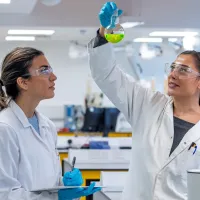
Chemistry
-
Study
- View all courses
- Taught postgraduate study
- Pre-sessional English courses
-
Subjects
- Acoustical engineering
- Aeronautical and astronautical engineering
- Ageing and gerontology
- Archaeology
- Art, design and fashion
- Audiology
- Biological sciences
- Biomedical and medical engineering
- Business, accounting, finance and marketing
- Chemistry
- Civil engineering
- Computer science and software engineering
- Economics
- Education
- Electrical and electronic engineering
- English
- Film studies
- French
- Geography and environmental science
- History
- Languages and linguistics
- Law
- Maritime engineering
- Mathematical sciences
- Mechanical engineering
- Medicine
- Music
- Nursing, midwifery and healthcare
- Ocean and Earth science
- Philosophy
- Photonics and optoelectronics
- Physics and astronomy
- Politics and international relations
- Psychology
- Social statistics and demography
- Sociology, social policy and criminology
-
PhDs and research degrees
- Create your own research project
-
Find a PhD project
- A missing link between continental shelves and the deep sea: Have we underestimated the importance of land-detached canyons?
- A study of rolling contact fatigue in electric vehicles (EVs)
- Acoustic monitoring of forest exploitation to establish community perspectives of sustainable hunting
- Acoustic sensing and characterisation of soil organic matter
- Advancing intersectional geographies of diaspora-led development in times of multiple crises
- Aero engine fan wake turbulence – Simulation and wind tunnel experiments
- Against Climate Change (DACC): improving the estimates of forest fire smoke emissions
- All-in-one Mars in-situ resource utilisation (ISRU) system and life-supporting using non-thermal plasma
- An electromagnetic study of the continent-ocean transition southwest of the UK
- An investigation of the relationship between health, home and law in the context of poor and precarious housing, and complex and advanced illness
- Antibiotic resistance genes in chalk streams
- Being autistic in care: Understanding differences in care experiences including breakdowns in placements for autistic and non-autistic children
- Biogeochemical cycling in the critical coastal zone: Developing novel methods to make reliable measurements of geochemical fluxes in permeable sediments
- Bloom and bust: seasonal cycles of phytoplankton and carbon flux
- British Black Lives Matter: The emergence of a modern civil rights movement
- Building physics for low carbon comfort using artificial intelligence
- Business studies and management: accounting
- Business studies and management: banking and finance
- Business studies and management: decision analytics and risk
- Business studies and management: digital and data driven marketing
- Business studies and management: human resources (HR) management and organisational behaviour
- Business studies and management: strategy, innovation and entrepreneurship
- Carbon storage in reactive rock systems: determining the coupling of geo-chemo-mechanical processes in reactive transport
- Cascading hazards from the largest volcanic eruption in over a century: What happened when Hunga Tonga-Hunga Ha’apai erupted in January 2022?
- Characterisation of cast austenitic stainless steels using ultrasonic backscatter and artificial intelligence
- Climate Change effects on the developmental physiology of the small-spotted catshark
- Climate at the time of the Human settlement of the Eastern Pacific
- Collaborative privacy in data marketplaces
- Compatibility of climate and biodiversity targets under future land use change
- Cost of living in modern and fossil animals
- Creative clusters in rural, coastal and post-industrial towns
- Deep oceanic convection: the outsized role of small-scale processes
- Defect categories and their realisation in supersymmetric gauge theory
- Defining the Marine Fisheries-Energy-Environment Nexus: Learning from shocks to enhance natural resource resilience
- Design and fabrication of next generation optical fibres
- Developing a practical application of unmanned aerial vehicle technologies for conservation research and monitoring of endangered wildlife
- Development and evolution of animal biomineral skeletons
- Development of all-in-one in-situ resource utilisation system for crewed Mars exploration missions
- Ecological role of offshore artificial structures
- Effect of embankment and subgrade weathering on railway track performance
- Efficient ‘whole-life’ anchoring systems for offshore floating renewables
- Electrochemical sensing of the sea surface microlayer
- Engagement with nature among children from minority ethnic backgrounds
- Enhancing UAV manoeuvres and control using distributed sensor arrays
- Ensuring the Safety and Security of Autonomous Cyber-Physical Systems
- Environmental and genetic determinants of Brassica crop damage by the agricultural pest Diamondback moth
- Estimating marine mammal abundance and distribution from passive acoustic and biotelemetry data
- Evolution of symbiosis in a warmer world
- Examining evolutionary loss of calcification in coccolithophores
- Explainable AI (XAI) for health
- Explaining process, pattern and dynamics of marine predator hotspots in the Southern Ocean
- Exploring dynamics of natural capital in coastal barrier systems
- Exploring the mechanisms of microplastics incorporation and their influence on the functioning of coral holobionts
- Exploring the potential electrical activity of gut for healthcare and wellbeing
- Exploring the trans-local nature of cultural scene
- Facilitating forest restoration sustainability of tropical swidden agriculture
- Faulting, fluids and geohazards within subduction zone forearcs
- Faulting, magmatism and fluid flow during volcanic rifting in East Africa
- Fingerprinting environmental releases from nuclear facilities
- Flexible hybrid thermoelectric materials for wearable energy harvesting
- Floating hydrokinetic power converter
- Glacial sedimentology associated subglacial hydrology
- Green and sustainable Internet of Things
- How do antimicrobial peptides alter T cell cytokine production?
- How do calcifying marine organisms grow? Determining the role of non-classical precipitation processes in biogenic marine calcite formation
- How do neutrophils alter T cell metabolism?
- How well can we predict future changes in biodiversity using machine learning?
- Hydrant dynamics for acoustic leak detection in water pipes
- If ‘Black Lives Matter’, do ‘Asian Lives Matter’ too? Impact trajectories of organisation activism on wellbeing of ethnic minority communities
- Illuminating luciferin bioluminescence in dinoflagellates
- Imaging quantum materials with an XFEL
- Impact of neuromodulating drugs on gut microbiome homeostasis
- Impact of pharmaceuticals in the marine environment in a changing world
- Improving subsea navigation using environment observations for long term autonomy
- Information theoretic methods for sensor management
- Installation effect on the noise of small high speed fans
- Integrated earth observation mapping change land sea
- Interconnections of past greenhouse climates
- Investigating IgG cell depletion mechanisms
- Is ocean mixing upside down? How mixing processes drive upwelling in a deep-ocean basin
- Landing gear aerodynamics and aeroacoustics
- Lightweight gas storage: real-world strategies for the hydrogen economy
- Machine learning for multi-robot perception
- Machine learning for multi-robot perception
- Marine ecosystem responses to past climate change and its oceanographic impacts
- Mechanical effects in the surf zone - in situ electrochemical sensing
- Microfluidic cell isolation systems for sepsis
- Migrant entrepreneurship, gender and generation: context and family dynamics in small town Britain
- Miniaturisation in fishes: evolutionary and ecological perspectives
- Modelling high-power fibre laser and amplifier stability
- Modelling soil dewatering and recharge for cost-effective and climate resilient infrastructure
- Modelling the evolution of adaptive responses to climate change across spatial landscapes
- Nanomaterials sensors for biomedicine and/or the environment
- New high-resolution observations of ocean surface current and winds from innovative airborne and satellite measurements
- New perspectives on ocean photosynthesis
- Novel methods of detecting carbon cycling pathways in lakes and their impact on ecosystem change
- Novel technologies for cyber-physical security
- Novel transparent conducting films with unusual optoelectronic properties
- Novel wavelength fibre lasers for industrial applications
- Ocean circulation and the Southern Ocean carbon sink
- Ocean influence on recent climate extremes
- Ocean methane sensing using novel surface plasmon resonance technology
- Ocean physics and ecology: can robots disentangle the mix?
- Ocean-based Carbon Dioxide Removal: Assessing the utility of coastal enhanced weathering
- Offshore renewable energy (ORE) foundations on rock seabeds: advancing design through analogue testing and modelling
- Optical fibre sensing for acoustic leak detection in buried pipelines
- Optimal energy transfer in nonlinear systems
- Optimal energy transfer in nonlinear systems
- Optimizing machine learning for embedded systems
- Oxidation of fossil organic matter as a source of atmospheric CO2
- Partnership dissolution and re-formation in later life among individuals from minority ethnic communities in the UK
- Personalized multimodal human-robot interactions
- Preventing disease by enhancing the cleaning power of domestic water taps using sound
- Quantifying riparian vegetation dynamics and flow interactions for Nature Based Solutions using novel environmental sensing techniques
- Quantifying the response and sensitivity of tropical forest carbon sinks to various drivers
- Quantifying variability in phytoplankton electron requirements for carbon fixation
- Resilient and sustainable steel-framed building structures
- Resolving Antarctic meltwater events in Southern Ocean marine sediments and exploring their significance using climate models
- Robust acoustic leak detection in water pipes using contact sound guides
- Silicon synapses for artificial intelligence hardware
- Smart photon delivery via reconfigurable optical fibres
- The Gulf Stream control of the North Atlantic carbon sink
- The Mayflower Studentship: a prestigious fully funded PhD studentship in bioscience
- The calming effect of group living in social fishes
- The duration of ridge flank hydrothermal exchange and its role in global biogeochemical cycles
- The evolution of symmetry in echinoderms
- The impact of early life stress on neuronal enhancer function
- The oceanic fingerprints on changing monsoons over South and Southeast Asia
- The role of iron in nitrogen fixation and photosynthesis in changing polar oceans
- The role of singlet oxygen signaling in plant responses to heat and drought stress
- Time variability on turbulent mixing of heat around melting ice in the West Antarctic
- Triggers and Feedbacks of Climate Tipping Points
- Uncovering the drivers of non-alcoholic fatty liver disease progression using patient derived organoids
- Understanding recent land-use change in Snowdonia to plan a sustainable future for uplands: integrating palaeoecology and conservation practice
- Understanding the role of cell motility in resource acquisition by marine phytoplankton
- Understanding the structure and engagement of personal networks that support older people with complex care needs in marginalised communities and their ability to adapt to increasingly ‘digitalised’ health and social care
- Unpicking the Anthropocene in the Hawaiian Archipelago
- Unraveling oceanic multi-element cycles using single cell ionomics
- Unravelling southwest Indian Ocean biological productivity and physics: a machine learning approach
- Using acoustics to monitor how small cracks develop into bursts in pipelines
- Using machine learning to improve predictions of ocean carbon storage by marine life
- Vulnerability of low-lying coastal transportation networks to natural hazards
- X-ray imaging and property characterisation of porous materials
- Funding your research degree
- How to apply for a PhD or research degree
- How to make a PhD enquiry
- Support while studying your PhD or research degree
- Exchanges and studying abroad
- Undergraduate study
-
Tuition fees, funding and scholarships
- Fee status
- Scholarships
- Undergraduate funding options
-
Postgraduate funding options
-
Postgraduate scholarships
- Black Futures Postgraduate Research Scholarships (Environmental and Life Sciences)
- Black Futures scholarship
- China Excellence Scholarship
- GREAT Scholarships 2025 – Egypt
- GREAT Scholarships 2025 – France
- GREAT Scholarships 2025 – Ghana
- Horizon Europe fee waiver
- India Excellence Scholarship
- Nigeria Excellence Scholarship
- Nursing Global Impact Scholarship (Child Nursing and Mental Health Nursing)
- Postgraduate Taught Diversity Scholarship (Environmental and Life Sciences)
- Social Impact Scholarships
- Southampton Business School (MSc) Dean Scholarship (UK)
- Southampton Faculty of Medicine PGT Talent Scholarship
- Southampton History Patricia Mather and Helen Patterson Scholarship
- Southampton MA Holocaust scholarships
- Southampton Philosophy David Humphris-Norman Scholarship
- Southampton Philosophy MA Scholarship
- Southampton Photonics Impact Scholarship
- Southampton UK Alumni Music Scholarship
- Study in Art and Media Technology Scholarship
- Thailand Excellence Scholarship
- The National Institute for Health and care Research South Central INSIGHT Programme
- The South Coast Doctoral Training Partnership Social Science PhD Studentships
- Vietnam Excellence Scholarship
- Spärck AI Scholarship
-
Postgraduate scholarships
-
International funding options
-
Scholarships for international students
- Engineering Global Talent Scholarship
- Higher Education Scholarships for Palestinians - HESPAL
- Medical Technology, Innovation and Design Master’s Scholarship
- Merit scholarships for international undergraduates
- Presidential bursaries
- Winchester School of Art Postgraduate Global Talent Scholarship
- Becas Chile Scholarship
- Chevening Scholarships
- China Scholarship Council Scholarships
- COLFUTURO Scholarships
- Commonwealth Distance Learning Scholarships
- Commonwealth Master's Scholarships
- Commonwealth PhD Scholarships
- Commonwealth PhD Scholarships for high income countries
- Commonwealth Shared Scholarships
- Excellence Scholarship
- FIDERH Scholarships
- Southampton Education Civic Scholarship
- Fulbright Awards
- Southampton Ageing and Gerontology Talent Scholarship
- Southampton Teachers' Postgraduate Scholarship
- FUNED Scholarships
- Great Scholarships 2024 – Mexico
- Great Scholarships 2024 – Nigeria
- Marshall Scholarship
- Saïd Foundation Scholarships
- Southampton Canadian Prestige Scholarship for Law
- Xiamen University PhD Scholarships
- GREAT scholarships 2026 – Indonesia
-
Scholarships for international students
- External funding opportunities
- Short courses
- Lunchtime evening and weekend courses
- Clearing
- Summer schools
- Get a prospectus
- Student life
-
Research
- Our impact
- Research projects
- Research areas
- Research facilities
- Collaborate with us
-
Institutes, centres and groups
- Active Living
- Advanced Fibre Applications
- Advanced Laser Laboratory
- Advanced Project Management Research Centre
- Antibody and Vaccine Group
- Astronomy Group
- Autism Community Research Network @ Southampton (ACoRNS)
- Bioarchaeology and Osteoarchaeology at Southampton (BOS)
- Bladder and Bowel Management
- Cell and Developmental Biology
- Centre for Defence and Security Research
- Centre for Developmental Origins of Health and Disease
- Centre for Digital Finance
- Centre for Eastern European and Eurasian Studies (CEEES)
- Centre for Empirical Research in Finance and Banking (CERFIB)
- Centre for Geometry, Topology, and Applications
- Centre for Global Health and Policy (GHaP)
- Centre for Green Maritime Innovation (cGMI)
- Centre for Health Technologies
- Centre for Healthcare Analytics
- Centre for Human Development, Stem Cells and Regeneration
- Centre for Imperial and Postcolonial Studies
- Centre for Inclusive and Sustainable Entrepreneurship and Innovation (CISEI)
- Centre for International Film Research (CIFR)
- Centre for International Law and Globalisation
- Centre for Internet of Things and Pervasive Systems
- Centre for Justice Studies
- Centre for Linguistics, Language Education and Acquisition Research
- Centre for Machine Intelligence
- Centre for Maritime Archaeology
- Centre for Medieval and Renaissance Culture (CMRC)
- Centre for Political Ethnography (CPE)
- Centre for Research in Accounting, Accountability and Governance
- Centre for Research on Work and Organisations
- Centre for Resilient Socio-Technical Systems
- Centre for Transnational Studies
- Child and Adolescent Research Group
- Clinical Ethics, Law and Society (CELS)
- Clinical Legal Education
- Computational Nonlinear Optics
- Cyber Security Academy
- Data Science Group
- Digital Oceans
- EPSRC and MOD Centre for Doctoral Training in Complex Integrated Systems for Defence and Security
- Economic Theory and Experimental Economics
- Economy, Society and Governance
- Electrical Power Engineering
- Environmental Hydraulics
- Gas Photonics in Hollow Core Fibres
- Geochemistry
- Global Health (Demography)
- Global Health Community of Practice
- Gravity group
- High Power Fibre Lasers
- Hollow Core Fibre
- Human Genetics and Genomic Medicine
- Infection
- Infrastructure Group
- Institute of Developmental Sciences
- Institute of Maritime Law (IML)
- Integrated Photonic Devices
- Interdisciplinary Musculoskeletal Health
- International Centre for Ecohydraulics Research (ICER)
- Language Assessment and Testing Unit (LATU)
- Laser-Direct-Write (LDW) Technologies for Biomedical Applications
- Law and Technology Centre
- Long Term Conditions
- Magnetic Resonance
- Mathematical Modelling
- Medicines Management
- Molecular and Precision Biosciences
- Multiwavelength Accretion and Astronomical Transients
- National Biofilms Innovation Centre (NBIC)
- National Centre for Research Methods
- National Infrastructure Laboratory
- Nature-Based Ocean Solutions
- Nonlinear Semiconductor Photonics
- Ocean Perception Group
- Operational Research
- Optical Engineering and Quantum Photonics Group
- Paediatrics and Child Health - Clinical and Experimental Sciences
- People, Property, Community
- Photonic Systems, Circuits and Sensors Group
- Physical Optics
- Primary Care Research Centre
- Quantum, Light and Matter Group
- Silica Fibre Fabrication
- Silicon Photonics
- Skin Sensing Research Group
- Southampton Ethics Centre
- Southampton Health Technology Assessments Centre (SHTAC)
- Southampton High Energy Physics group
- Southampton Imaging
- Southampton Theory Astrophysics and Gravity (STAG) Research Centre
- Stefan Cross Centre for Women, Equality and Law
- String theory and holography
- The India Centre for Inclusive Growth and Sustainable Development
- The Parkes Institute
- Tony Davies High Voltage Laboratory
- Ultrafast X-ray Group
- Vision Science
- WSA Exchange
- Work Futures Research Centre (WFRC)
- Support for researchers
- Faculties, schools and departments
- Interdisciplinary research
- Find people and expertise
- Research jobs
- Business
- Global
- About
- Visit
- Alumni
- Departments
- News
- Events
- Contact
